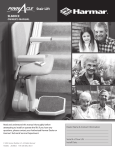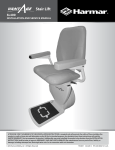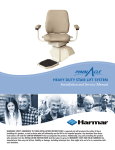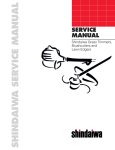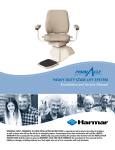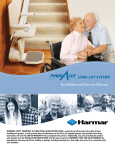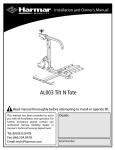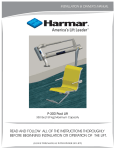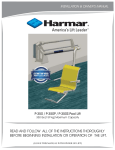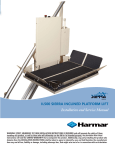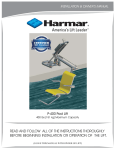Download Installation Manual
Transcript
Stair Lift SL600CE INSTALLATION AND SERVICE MANUAL ATTENTION! STRICT ADHERENCE TO THESE INSTALLATION INSTRUCTIONS is required and will promote the safety of those installing this product, as well as those who will ultimately use the lift for its intended purpose. Any deviation from these instructions will void the LIMITED WARRANTY that accompanies the product. Additionally, any party installing the product who deviates from the INSTALLATION INSTRUCTIONS shall be taken to agree to INDEMNIFY, SAVE AND HOLD HARMLESS the manufacturer from any and all loss, liability or damage, including attorneys fees, that might arise out of or in connection with such deviation. Part Number: 630-00012 Rev A Pinnacle Stair Lift CONTENTS Contents PRELIMINARY CHECKS 3 Tools Required . . . . . . . . . . . . . . . . . . . . . . . . . . . . . . . . 3 Included Parts . . . . . . . . . . . . . . . . . . . . . . . . . . . . . . . . . 3 INSTALLATION PROCEDURES 4-12 Determine Rail Length. . . . . . . . . . . . . . . . . . . . . . . . . 4 Rail Installation . . . . . . . . . . . . . . . . . . . . . . . . . . . . . . 5-6 Chassis Installation. . . . . . . . . . . . . . . . . . . . . . . . . . . . . 7 Final Rail Installation. . . . . . . . . . . . . . . . . . . . . . . . . 8-9 Footrest And Seat Installation . . . . . . . . . . . . . 10-12 REMOTE CONTROL OPERATION 13 Remote Control Operation. . . . . . . . . . . . . . . . . . . 13 Remote Control Reprogramming. . . . . . . . . . . . . 13 COMPLETION PROCEDURES 14-15 Test Armrest Control Switch. . . . . . . . . . . . . . . . . . 14 Tighten Brackets. . . . . . . . . . . . . . . . . . . . . . . . . . . . . 14 Set Upper And Lower Travel Limits. . . . . . . . . . . . 14 Test Safety Stop Switches. . . . . . . . . . . . . . . . . . 14-15 Additional System Checks. . . . . . . . . . . . . . . . . . . . 15 2 SAFETY SYSTEMS TESTING 16-19 FOLDING RAIL INSTALLATION 20-25 | www.harmar.com Read and understand this manual prior to attempting stair lift installations. Please refer to the Owner’s Manual for Limited Warranty information and operating instructions. The Owner’s Manual must be given to the owner of the lift before it is put into service. Any alterations to the equipment without written authorization by the manufacturer may void the warranty. Harmar lifts are designed to install with as little assembly by the installer as possible. If you have questions, concerns or comments, please contact Harmar’s Technical Service Department. SYMBOLS USED IN THIS MANUAL READ MANUAL - Pay close attention to the instructions in the manual. CAUTION - Hazardous situation. If not avoided, could result in serious damage to property. WARNING - Hazardous situation. If not avoided, could result in serious injury to installer or user. TIP - Helpful tips that will facilitate ease of installation. INDICATIONS OF USE STATEMENT The Pinnacle CE Stair Lift is to assist transfer of patients or mobility impaired persons, up and down between levels of a residential or private facility. © 2014Harmar Mobility, LLC • All Rights Reserved PRELIMINARY CHECKS Pinnacle Stair Lift Tools Required Rail Box: The following is a suggested list of basic tools to have on hand during installation. Bottom rail pre-installed with: Cordless drill Bottom end plate Allen wrench (5/64”, 5/32”, 3/16”, 5/16”) Charge strip wire harness Phillips screwdriver (#3) Bottom limit cam Nut driver (3/8” and 5/16”) Joint pins and joint brackets 6-10” driver extension (two-piece rail only) Plastic gear rack T30 Torx bit (included) Top rail pre-installed with: Level Hack saw or chop saw SAE socket set SAE wrenches Tape measure In Tray 2 Call/send hand controls Power Supply Manual Overide Tool Installation Manual Owner’s Manual Rail accessories (plastic bag): Top end plate Compression bolts (2 sizes) Self-cutting screws (1/4”-20 X 1”) Torx T30 driver bit Rail brackets (2, 3, 4, or 6 per set) Before beginning installation, please inspect and check the box contents. Report any damage to your dealer. Chassis Charge strip wire harness Rail Bracket Box: Included Parts Chassis Box: Wood screws (#14 X 2” (4 per rail bracket) Chair and Footrest Box: Chair with seat belt Footrest complete with: Adjustable seat height frame Plastic vertical cover Nylon plugs (5) Seat swivel post with fasteners Rail parts (plastic bag): Extra plastic racks (2 or 3) Top limit cam TEC0033 20140813 P/N: 630-00012 Rev B SL600CE • Pinnacle Stair Lift Installation Manual 2014 3 Pinnacle Stair Lift INSTALLATION PROCEDURES A. DETERMINE OVERALL RAIL LENGTH (Only if rail did not come pre-cut to length) 1: Determine any obstructions that will affect the position and length of the rail. These may include walls, doors, hallway orientation, etc. 2: Measure the overall length of the stairs from the nose at the top landing of the stairs to the floor at the bottom (nose to floor measurement, (e.g. 325 cm (128 in)). [Figure 4-1] 3: For a normal stairway with adequate space for a landing, add 33 cm (13 in) to the nose to floor measurement. This will provide enough rail length to allow the stair lift to be adjusted so that the floor-to-seat height will be the same at both the top and bottom (e.g., 358 cm (141 in)). Figure 4-1 4: If the top landing has restrictions (i.e., a wall or doorway), use the chart below to determine the length of extension that should be used. 5: To cut the rail, use a standard 12” chop saw, with a blade designed to cut aluminum. Do not cut rail inside the house (aluminum chips are very hard to remove from carpets) TIP Extension 17 cm / 7 in 9.9 cm / 3.9 in 23 cm / 9 in 12.7 cm / 5 in 28 cm / 11 in 15.5 cm / 6.1 in 33 cm / 13 in 18.3 cm / 7.2 in Horizontal intrusion on top landing DO NOT cut the end of the rail that contains the joint holes. TIP Remove the charger strips and wire harness before cutting. Installation Site Electrical Requirements - The lift shall be connected to a dedicated 110-230 V electrical circuit that is protected by a 30mA residual current device. Lighting Requirements - The stairway where the lift is installed shall have a minimum of 50 lux lighting in the areas where the lift will be boarded. 4 | www.harmar.com © 2014Harmar Mobility, LLC • All Rights Reserved INSTALLATION PROCEDURES Pinnacle Stair Lift B. RAIL INSTALLATION 1: Open the rail box and remove the contents. 2: Position the bottom rail (the rail with end plate attached) directly on the stairs with the end plate towards the bottom of the stairs and the plastic rack facing up. Place an object that measures between 2 cm and 2.5 cm (3/4 in and 1 in) between end plate and the floor. [Figure 5-1 and 5-2] Figure 5-1 TIP Figure 5-2 Use the chair box or another heavy object, like a toolbox, at the bottom to prevent the rail from sliding down the stairs. 3: Position the two ends of the rail close together. Locate and connect the plug on the ends of the two power harnesses inside the two rail pieces. [Figure 5-3] 4: With the plastic rack facing up, slide the top rail into the bottom rail and guide them together using the pre-installed pins. Gently tap the top rail if necessary to get them close together. Be cautious not to pinch the power harness. [Figure 5-4] 5: Install two (2) joint fasteners and firmly tighten with 3/16” Allen wrench. Then slide rack pieces down to cover joint. [Figure5-5] 6: Turn over joined rails and install the remaining two (2) joint fasteners and firmly tighten with 3/16” Allen wrench. Then slide rack pieces down to cover joint. [Figure 5-6] 7. Install rail brackets by loosening the screws and snapping each bracket edge into the slot, or slide the brackets on from the top of the rail. [Figure 5-7] Figure 5-3 Figure 5-4 Figure 5-5 Figure 5-6 Figure 5-7 TIP The brackets are tightened from one side only. It is important that the bracket be installed with the screw side facing the wall so when the rail is turned over to its correct orientation the screws will be accessible. TEC0033 20140813 P/N: 630-00012 Rev B SL600CE • Pinnacle Stair Lift Installation Manual 2014 5 Pinnacle Stair Lift INSTALLATION PROCEDURES 8. A. For double rails, the first rail bracket should be tightened in place so when turned over the back of the bracket touches the rear of the first step from the bottom landing. The second and third brackets should be placed and tightened on the steps on each side of the rail joint, again so the back of the bracket touches the rear of the step. The fourth and final bracket should be placed on the last step before the top landing, again tightening it so it touches the front of the rear of the last step. B. Tighten the first rail bracket in place so when turned over the back of the bracket touches the rear of the first step from the bottom landing. Place the other rail on the last step before the top landing, again tightening it so it touches the rear of the last step. 9. Turn the rail right side up (plastic side facing up). [Figure 6-1] Figure 6-1 Figure 6-2 Figure 6-3 10. Measure any obstruction from the wall (this may include handrails, molding, light switches, etc.) and adjust the edge of the brackets an equal distance from the wall. 11. The underside of the rail must be at least 5 cm (2 in) above the stair tread nose to provide clearance for the footrest. To achieve this 5 cm (2 in) clearance move the rail and bracket forward. Once the clearance is 5 cm (2 in) tighten all bracket nuts to hold the brackets in position. To maintain the 5 cm (2 in) clearance, and to hold the rail in place, secure the bottom bracket to the first step from the floor with 2-5 cm (2 in) wood screws, using a 3/8" nut driver on a 6-10” extension of a cordless drill. [Figure 6-2 and 6-3] 6 | www.harmar.com © 2014Harmar Mobility, LLC • All Rights Reserved INSTALLATION PROCEDURES Pinnacle Stair Lift C. CHASSIS INSTALLATION 1. Remove plastic bag from chassis box. Lift the chassis with the manual override hole (on bottom) facing the downhill side of the stairs and gently slide the chassis onto the rail until it makes contact with the plastic rack. DO NOT LET THE CHASSIS FREE FALL DOWN THE RAIL. WARNING Be careful not to trap fingers between the rail and the chassis. 2. Use the installation switch (the black switch on the top of the chassis) to move the chassis at least 60 cm (24 in) down the rail, pushing gently on the chassis to ensure the chassis does not pull any rack to the top. 3. Unplug the jumper wire from the top of the chassis. 4. Loosen, but do not remove, the four (4) seatleveling bolts two (2) on each side of the chassis) and then align them vertically using a level. Firmly tighten the two (2) bolts on the side of the chassis facing the wall. WARNING Do not ride on the chassis or lift until the install is complete. TEC0033 20140813 P/N: 630-00012 Rev B SL600CE • Pinnacle Stair Lift Installation Manual 2014 7 Pinnacle Stair Lift INSTALLATION PROCEDURES D. FINAL RAIL INSTALLATION 1. Install the remaining plastic rack pieces in the upper rail. [Figure 8-1] 2. Use a hacksaw or chop saw to cut the last plastic rack piece flush with the rail end. Place something on the floor to catch debris or mark and cut the rack outside. [Figure 8-2] Figure 8-1 The exposed, cut end of the plastic rack should be facing the top end of the rail (the factory-cut side should butt against the lower rack). 3. Slide the top limit cam into one of the cam slots (it doesn’t matter which side), and tighten the pre-inserted Allen screw with a 5/64” Allen wrench. This will be used to set the final upper limits for the stair lift 4. Remove charging strip from the rail box. Connect charging strip connector to the power wire that runs through the center of the rail from the lower charging strips. [Figure 8-3] Insert the two (2) charger strips into the keyed slots at the top of the rail (while standing on the top landing looking down). The charging strip with the red wire should be inserted into the left slot with the metal strip facing out. The charging strip with the black wire should be inserted into the right slot with the metal strip pointing out. [Figure 8-4] Figure 8-2 Figure 8-3 Figure 8-4 Bend the red and black wire tabs in toward the center of the track. Insert excess cable into the rail, leaving the pigtail with the Molex connector on the outside. 8 | www.harmar.com © 2014Harmar Mobility, LLC • All Rights Reserved INSTALLATION PROCEDURES Pinnacle Stair Lift 5. Install the end plate to the top of the track with the four (4) self-cutting Torx screws using the supplied T30 Torx bit. [Figure 9-1] TIP Too much torque applied to these screws may result in damage. Take your time and apply grease to threads. 6. Install one of the rack pre-compression screws in the threaded hole in the top plate of the rail, and tighten it as firmly as possible by hand with a 5/32” Allen wrench. [Figure 9-2] Figure 9-1 Figure 9-2 There are two (2) kinds of pre-compression screws: • 3/4” for rails under 3.65 m (12 ft) • 1” for rails over 3.65 m (12 ft) 7. Plug in the power supply at either end of the rail, depending on the closest or most convenient location of a wall power supply. Minimize wire length and intrusion. [Figure 9-3 & 9-4] Figure 9-3 Figure 9-4 TEC0033 20140813 P/N: 630-00012 Rev B SL600CE • Pinnacle Stair Lift Installation Manual 2014 9 Pinnacle Stair Lift INSTALLATION PROCEDURES E. FOOTREST & SEAT INSTALLATION 1. Remove footrest from box and use the installation switch to drive the chassis downward to a position about 15 cm (6 in) clear of the floor. This will provide a safe area to install and adjust the footrest. Do not drive the unit into bottom stop. [Figure 10-1] 2. Turn the red “ON/OFF” switch located on the top of the chassis to the “OFF” position (0). Figure 10-1 3. Position the footrest onto the two (2) seatleveling bolts on the outside of the chassis by aligning the large opening at the slot ends of the footrest. [Figure 10-2] 4. Ensure the footrest is fully engaged. 5. Check that the height of the seat base is correctly set for the intended user. A seat height guide is provided behind the plastic footrest shroud. Consult with the client and use an existing chair or walker with armrests as a guide. If the height of the seat needs to be adjusted, loosen and remove the four (4) bolts on the sides of the seat base using a 5/32” Allen wrench. Adjust the seat base up or down relative to the footrest structure until the holes align, then replace and securely tighten the four (4) bolts. [Figure 10-3] Figure 10-2 Figure 10-3 6. Connect the footrest cable to the 6-pin connector on the chassis. [Figure 10-4] 7. Position the keyed seat swivel post in the hole in the seat base hole closest to the top of the stairs. Securely tighten the two (2) bolts on the sides of the hold using a 5/32” Allen wrench. [Figure 10-5] Figure 10-4 8. Use the supplied white plastic plugs to secure the vertical footrest shroud to the main footrest cover plate. Figure 10-5 10 | www.harmar.com © 2014Harmar Mobility, LLC • All Rights Reserved INSTALLATION PROCEDURES 9. Position the seat directly aligned over the carriage and place onto the seat swivel post. Depress the swivel lever until the seat is fully engaged with the swivel post. Check the swivel lever to test the locking mechanism. THE SYSTEM WILL NOT FUNCTION IF PROPER ENGAGEMENT IS NOT ACHIEVED. [Figure 11-1] Pinnacle Stair Lift Figure 11-1 10. Connect the seat cable to the 8-pin connector on the chassis. [Figure 11-2] TIP When the 6-pin footrest and/or the 8-pin chair cables are connected to the chassis, the black installation switch on the chassis is disabled and will not function. 11. The armrest control is factory set for right-hand operation. If the user prefers to operate the armrest controls with their left hand, loosen the single screw on the underside of each armrest and slide each armrest upwards. Disconnect the plug on the armrest control, switch the armrests, and reconnect the plug. Replace armrests and tighten screws. [Figure 11-3 & 11-4] [igure 11-2 Figure 11-3 12. Ensure that the key switch on the armrest control is in the locked position (with the key in the vertical position) [Figure 11-5] 13. Turn the red “ON/OFF” switch located on the top of the chassis to the “ON” (I) position. You should hear a single beep and the LED indicator light on the armrest control should cycle through a test sequence, showing red, yellow and green respectively. If any of the system controls or safety sensors are engaged the LED indicator light will turn to yellow. [Figure 11-6] Figure 11-4 Figure 11-5 Figure 11-6 TEC0033 20140813 P/N: 630-00012 Rev B SL600CE • Pinnacle Stair Lift Installation Manual 2014 11 Pinnacle Stair Lift INSTALLATION PROCEDURES 14. If the LED indicator light is not green, check the safety senors: 1. Seat swivel sensor (seat should be in the locked position) 2. Footrest lower sensor (check by pushing in on the safety pan on the footrest) Figure 12-1 3. Upper foot pan safety sensor (check by pushing on the safety pan on the footrest). 4. Front foot pan safety sensor (check by pushing on the safety pan on the footrest). 5. Uphill safety sensor (ensure nothing is blocking upward passage) 6. Downhill safety sensor (ensure nothing is blocking downward passage) If the LED indicator light is still not green after testing sensors, turn the unit off and re-check all wire plugs. Turn the unit on again and re-check the LED indicator light cycle. When the LED indicator light remains green the lift is ready to operate. [Figure 12-1] 12 | www.harmar.com © 2014Harmar Mobility, LLC • All Rights Reserved REMOTE CONTROL OPERATION Pinnacle Stair Lift Remote Call/Send Control Operation A. REMOTE CONTROL OPERATION B. REMOTE CONTROL RE-PROGRAMMING The key switch on the arm of the chair must be in the “ON” position to use the remote call/send control. All call/send controls are factory programmed. Reprogramming is not normally necessary during installation. 1. Press and hold the appropriate directional button on the front of the hand control. In the event that the remote call/send control needs to be re-programmed, it is essential to program BOTH controls in one programming cycle. Do so by completing the following: The chair lift will operate with or without a rider. All safety sensors on the chair lift are designed to continue to operate in their normal mode. The LED light indicator on the armrest will display the appropriate color. 1. Start with the red “ON/OFF” switch in the “OFF” position (0). 2. Disconnect the 6-pin footrest and 8-pin chair wire harnesses from the chassis. 2. If the chair lift fails to respond, this may indicate the batteries are discharged and need to be replaced. Remove the back cover of the control and replace with commonly available AAA batteries, ensuring that the polarity is correct. 3. Press and hold the install switch (located on the top of the chassis) in either direction. 4. Turn the red “ON/OFF” switch to the “ON” position (I). Wait for circuit board to beep and then release the install switch. 5. The lift will begin to beep rapidly (this means the first remote control is ready to program). 6. Press and release the “UP” or “DOWN” button of the first remote control (the first remote control is now programmed). 7. Press and release the “UP” or “DOWN” button of the second remote control (the second remote control is now programmed). 8. Upon completion, two beeps will indicate that both remote controls have been programmed. 9. Turn the “ON/OFF” switch to the “OFF” position (0). 10. Connect the 6-pin footrest and 8-pin chair wire harnesses to the chassis and then turn the red “ON/ OFF” switch to the “ON” position (I). 11. Test each remote control in both the up and down directions. TEC0033 20140813 P/N: 630-00012 Rev B SL600CE • Pinnacle Stair Lift Installation Manual 2014 13 Pinnacle Stair Lift COMPLETION PROCEDURES Completion Procedures A. TEST ARMREST CONTROL SWITCH 1. Ensure that the unit travels correctly by operating the armrest control switch while standing in front of the unit. 2. Depress the switch in the upstairs direction to move up. The lift will begin to smoothly accelerate upwards. The lift will continue to move upwards as long as the switch is depressed. 3. Release the switch and the lift will come to an immediate stop. 4. Depress the switch in the downstairs direction to move down. The lift will begin to smoothly accelerate downwards. 5. Release the switch and the lift will come to an immediate stop. 6. Run the chair all the way up and down the rail to ensure that the top of the seat back has at least a 1.25 cm (1/2 in) clearance from the wall and any obstructions. WARNING Do not ride on the chassis or lift until the install is complete. B. TIGHTEN BRACKETS 1. Install and fully tighten the rail bracket mounting screws (four (4) screws per bracket). For hardwood stairs, a pilot hole should be drilled first. For plywood or particle board stairs care must be taken to prevent stripping. C. SET UPPER AND LOWER TRAVEL LIMITS 1. Test the lower travel limit by operating the lift downward, keeping the switch depressed. The unit should begin to decelerate about 7.5 cm (3 in) from its final resting position and stop clear of the floor. 14 | www.harmar.com 2. The final stopped position can be adjusted to accommodate the height of the user by repositioning the limit cam located in a slot in the rail. 3. Use a 5/64” Allen wrench to loosen the set screw in the limit cam. Adjust the limit cam up or down and retighten the set screws. Repeat the above steps until the lift stops in the desired position. 4. Repeat the above steps to set the upper limits. For safety, the footrest should be set at least level with the upper landing. 5. The optimum position is met when the seat height above the floor is the same at the top and bottom of the stairs. D. TEST SAFETY STOP SWITCHES 1. Safety stop switches are located in both the upward and downward ends of the chassis providing protection from obstructions on the rail. 2. Safety stop switches are located in the footrest bottom pan providing protection from obstructions and trapping hazards on the stairs. 3. A safety stop switch is part of the swivel seat mechanism and prevents the lift from operating when the swivel is in use. 4. Test all the safety stop switches by driving the lift down and touching the downward end of the chassis, the lower edge of the footrest, and the underside of the footrest in both its folded and unfolded positions. 5. In each of the above cases the unit should come to an immediate halt. The LED indicator light on the armrest control should turn to orange and the unit should beep intermittently. 6. When the control switch is released, the unit should NOT be able to be driven in the direction that the lift initially engaged the obstacle. Test this condition. © 2014Harmar Mobility, LLC • All Rights Reserved COMPLETION PROCEDURES 7. Test to ensure that the lift can only be driven away from the obstruction. The LED indicator light will turn to green and stop beeping indicating a safe operating condition. 8. Repeat the above tests while driving the lift in opposite direction. 9. If any safety condition does not function properly, carefully review all installation instructions, reset the “ON /OFF” switch and check that the LED indicator light is green. Repeat the above tests. Pinnacle Stair Lift 5. Test the seat swivel at the top by using the levers and swiveling the seat towards the landing and stop the seat at 35 and 85 degrees. The seat swivel levers will release into a locked position at each of these angles. The lift will not operate in any of these positions if the control switch is depressed, and the LED indicator light will turn orange. Return the seat to its normal position and the LED indicator light will turn green and the lift will now operate normally. 10. If any safety stop switch fails to immediately stop the lift and/or a red LED indicator light appears, remove the key to prevent further use of the lift and immediately call the manufacturer for assistance in diagnosing and repairing the problem. DO NOT USE THE LIFT. E. ADDITIONAL SYSTEM CHECKS 1. After the successful testing of all safety switches, sit on the lift and operate to the top of the stairs. Keeping the control switch depressed continuously, the lift should gently decelerate and then stop at the top of the rail. 2. As a final adjustment, sit on the lift and do two (2) complete up trips and stop with the chair at the bottom. Then tighten the compression screw in the top end plate, then run the chair to the top and again tighten the compression screw. Run the chair to the middle and do a final tightening of the compression screw. 3. Drive the lift to the bottom, keeping the control switch depressed all the time, and check that the lift gently decelerates and stops so the footrest pan is clear of the floor. If necessary adjust the limit cams with a 5/64” Allen wrench. 4. Move the lift about 1 m (3 ft) from either the top or bottom of the rail. After 30 seconds the armrest LED indicator light will show orange and beep indicating that the lift is not positioned on a charge point. The beep will stop after 30 seconds, but the armrest LED indicator light will continue to flash orange. TEC0033 20140813 P/N: 630-00012 Rev B SL600CE • Pinnacle Stair Lift Installation Manual 2014 15 Pinnacle Stair Lift SAFETY SYSTEMS TESTING Procedure to Test Safety Systems Over Speed 1. Remove the pivoting end panel from the chassis as shown [Figure 16-1]. 2. Use a screwdriver to trip the safety by pressing on the part shown [Figure 16-2]. The part will move downward and click into a new position. 3. Verify that this has disabled the lift by pressing Up/Down on the lift's toggle switch. The lift should not move. 4. Rest the system by pressing up on the part as shown [Figure 16-3]. The part will move upward and click into its original position. Figure 16-1 Manual Overide Tool 1. Insert the supplied manual overide tool onto the hex shaft in the location shown [Figure 16-4]. 2. Verify this has disabled the lift by pressing Up/ Down on the lift's toggle switch. The lift should not move. Figure 16-2 Armrest 1. Fully raise the armrest on the down stairs side of the chair. Figure 16-3 2. Verify this has disabled the lift by pressing Up/ Down on the lift's toggle switch. The lift should not move. 3. Verify this has not disabled the remote call send stations. Press the Up/Down buttons. The lift should move in each direction. Figure 16-4 16 | www.harmar.com © 2014Harmar Mobility, LLC • All Rights Reserved SAFETY SYSTEMS TESTING Pinnacle Stair Lift Footrest 1. Fully raise the footrest. 2. Verify this has disabled the lift by pressing Up/ Down on the lift's toggle switch. The lift should not move. 3. Verify this has not disabled the remote call send stations. Press the Up/Down buttons. The lift should move in each direction. Seat Rotation 1. Rotate the seat lock downward as far as possible. At this point the seat pivot will be unlocked and the seat will be free to rotate to the side. [Figure 17-1] 2. Verify this has disabled the lift by pressing Up/Down on the lift's toggle switch. The lift should not move. Emergency Stop Figure 17-1 1. Press the red emergency button located on the lift's armrest. 2. Verify this has disabled the lift by pressing Up/ Down on the lift's toggle switch. The lift should not move. TEC0033 20140813 P/N: 630-00012 Rev B SL600CE • Pinnacle Stair Lift Installation Manual 2014 17 Pinnacle Stair Lift SAFETY SYSTEMS TESTING Over Speed Gear Reset Procedure 1. Turn off lift from ON/OFF switch on chassis 2. How to identify if the Over Speed gear has been tripped: • The lift will not run in the up or down direction • Remove the pivoting end panel from the chassis as shown [Figure 18-1] Figure 18-1 3. Inspect the area under the end panel. If its appearance matches the second picture [Figure 18-2] then the system is tripped. Figure 18-2 4. Insert the manual override tool onto the hex key on the opposite side of the chassis. Turn the tool and advance the chassis 3 cm (1in) up the rail. [Figure 18-3] Figure 18-3 5. Reset the system by pressing up on the part as shown [Figure 18-4]. The part will move upward and click into its original position. Figure 18-4 18 | www.harmar.com © 2014Harmar Mobility, LLC • All Rights Reserved SAFETY SYSTEMS TESTING Pinnacle Stair Lift 6. Turn on lift from ON/OFF switch on chassis. 7. Verify the lift operates by pressing Up/Down on the lift's toggle switch. The lift should move in each direction. 8. After the Over Speed has been reset you should inspect the over speed cam for damage. Remove the seat and plastic covers from the chassis [Figure 19-1]. Figure 19-1 9. Inspect the area shown [Figure 19-2]. You may need to use the manual override tool to rotate the gearing so the cam is visible through the window. Verify the cam does not show any signs of damage. 10. Reattach the seat and plastic covers. Figure 19-2 THE LIFT IS NOW READY TO USE TEC0033 20140813 P/N: 630-00012 Rev B SL600CE • Pinnacle Stair Lift Installation Manual 2014 19 Pinnacle Stair Lift FOLDING RAIL INSTALLATION Folding Rail Installation Note - The photos in this section show a "left" folding rail, assembled to be installed on the left side of the stairway. If you’re assembling a "right’"side, please complete all of these steps in mirror-image to what’s shown. As always, if you encounter any difficulty, please call Harmar Technical Support at: UK - +44-0121-314-7450 or EU - +31-(0)76-7602824 or USA - +1 (866) 351-2776 FOLDING RAIL INSTALLATION PROCEDURES 1. Orient the two rail brackets onto the folding rail as shown [Figure 20-1], with the nuts on the same side as the folding mechanism (for either left or right folding). [Figure 20-2] Figure 20-1 Figure 20-2 2. Expand and snap the two brackets over the rail, so the top is in the bracket-groove. [Figure 20-3] Figure 20-3 3. Partially tighten the two nuts that position these on the rail, using a 1/2" wrench (deep socket preferred), so they won’t slide when you’re testfitting the position. [Figure 20-4] Figure 20-4 20 | www.harmar.com © 2014Harmar Mobility, LLC • All Rights Reserved FOLDING RAIL INSTALLATION Pinnacle Stair Lift 4. Place the rail onto the stairway with the bottom bracket on the second step, as shown. Note that the bottom feet should approximately rest on the floor with the rail straight, but they will be adjusted later. [Figure 21-1] Figure 21-1 5. Measure to verify that the underside of the rail is more than 5 cm (2 in) from the stair noses, both at the second step bracket and at the upper bracket. If not, reposition the brackets as needed. This clearance is required for the stair lift footrest. In some installations, you may not be able to get 5 cm (2 in) or more with the standard stair-bracket. Contact Harmar to get tall brackets. [Figure 21-2 & 21-3] Bottom bracket 5 cm (2 in) or more Figure 21-2 Upper bracket 5 cm (2 in) or more Figure 21-3 6. Measure from the side of the rail to the wall. The minimum clearance that will work with a folding stair lift rail is 7.5 cm (3 in). Set the folding section of the stair lift rails to a distance of 7.5 cm (3 in) from the wall or more. This will leave about 1.25 cm (1/2 in) of clearance at the ball of the gas-spring. [Figure 21-4] Figure 21-4 TEC0033 20140813 P/N: 630-00012 Rev B SL600CE • Pinnacle Stair Lift Installation Manual 2014 21 Pinnacle Stair Lift FOLDING RAIL INSTALLATION 7. Fasten down the near corner of the lower bracket using a drill that has extensions at least 25 cm (10 in) long and a 3/8” socket. [Figure 22-1 & 22-2] 8. Measure from the side of the rail at the upper bracket of the folding rail. Set this at 7.5 cm (3 in) or more. Screw down one corner of the bracket. 9. Join to upper rail, following regular procedures (this procedure is detailed on page 5). This procedure includes plugging the battery charging wire harness for the folding rail into the charging harness from the upper rail. The power supply itself can be plugged into either the top rail (for the top of the stairs), or to the charge plug from the folding rail, which comes out just higher than the folding mechanism for the bottom of the stairway. Figure 22-1 Figure 22-2 10. Fasten down the other screws of both rail brackets using the power drill and long extension with the 3/8” socket. [Figure 22-3] Figure 22-3 11. Adjust the height of the two feet using a 9/16" open end wrench. Set them so that both rest on the floor with the rail fully straight. The foot farther from the wall should be set a little taller than the inside one to get it to seat flat on the floor, since the Pinnacle rail brackets intentionally lean the rail toward the wall just a little. [Figure 22-4] 22 | www.harmar.com Figure 22-4 © 2014Harmar Mobility, LLC • All Rights Reserved FOLDING RAIL INSTALLATION Pinnacle Stair Lift 12. If you’re installing the feet onto carpet, screw down a piece of wood or metal to make the feet seat reliably. [Figure 23-1] Figure 23-1 13. Carefully move the fork with your hand to make sure it operates smoothly. Allow it to go all the way to the floor. Confirm that both feet sit level on the floor and the hinge-joint is fully straight. [Figure 23-2] WARNING Be careful not to pinch your fingers when moving the fork. Figure 23-2 14. Follow the normal procedure for installing rail brackets and tightening them. This procedure is detailed on pages 5 & 6 (steps 7 & 8). 15. Test ride the unit a couple of times to verify that the folding rail is operating properly. TEC0033 20140813 P/N: 630-00012 Rev B SL600CE • Pinnacle Stair Lift Installation Manual 2014 23 Stair Lift SL600CE INSTALLATION AND SERVICE MANUAL Harmar Europe Harmar UK Ltd Harmar USA www.harmar.com 28-2 De Slof 5107 RJ Dongen Unit 35 Phoenix Industrial Estate Charles Street Great Bridge West Bromwich B70 0A Phone: +44 0121 314 7450 2075 47th Street email: [email protected] Netherlands Phone: +31 (0)76 2019262 Fax: +31 (0)76 5236031 Sarasota, FL, USA 34234 Phone: 1 (941) 351-2776 Fax: 1 (866) 234-5680 TEC0033 20140813 P/N: 630-00012 Rev B
























